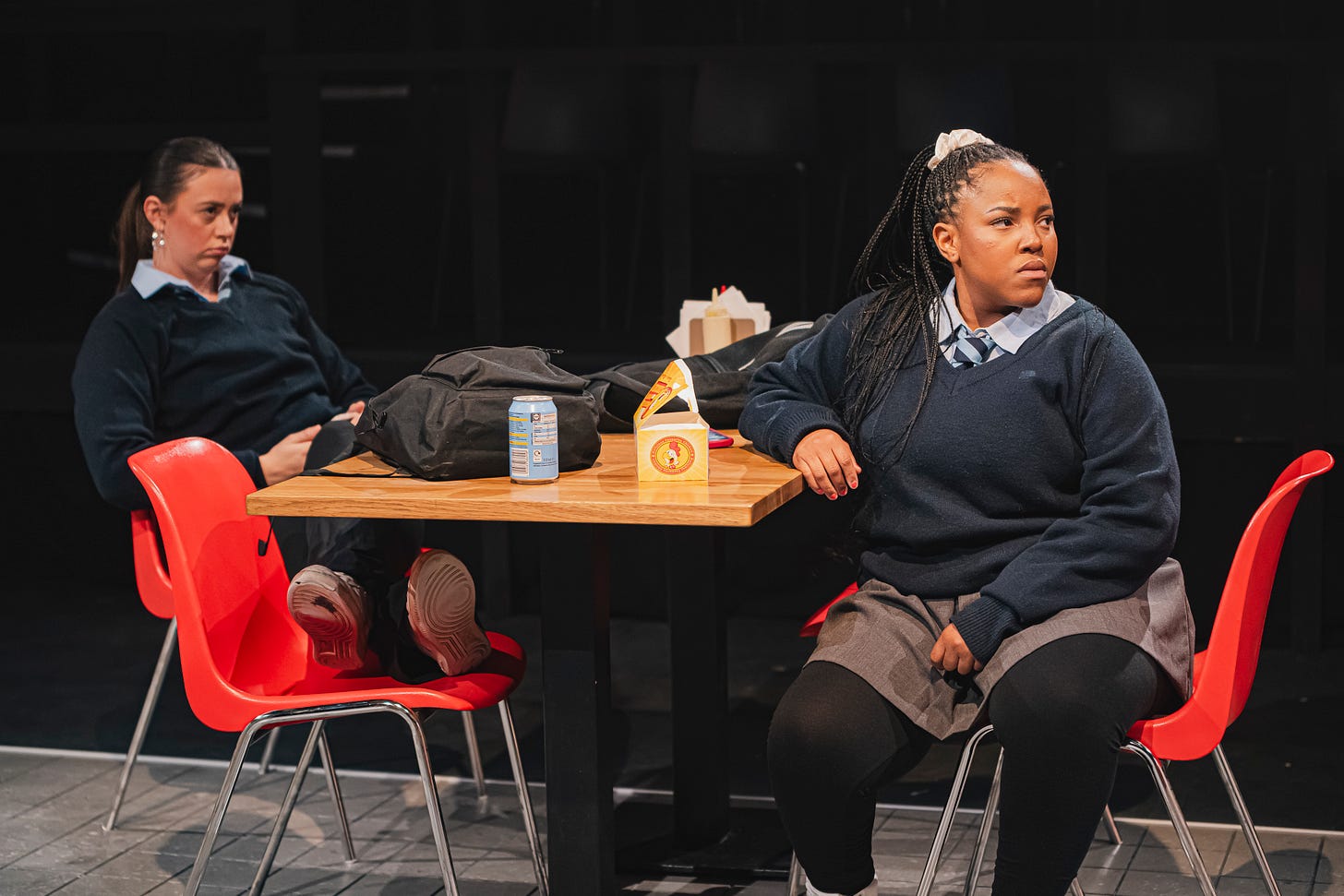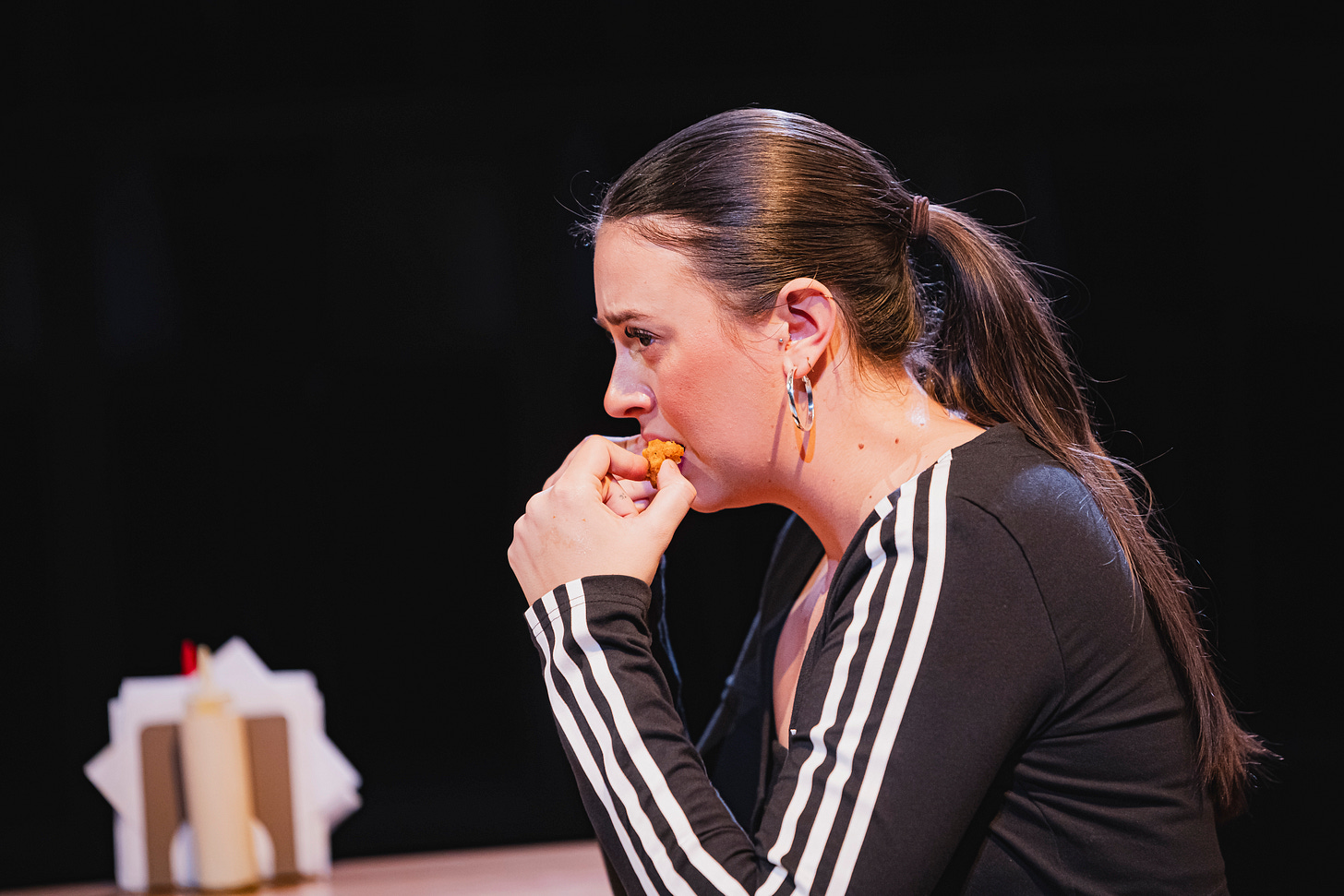Hot Chicks by Rebecca Hammond is a look at drug running across county lines and the grooming of young women- by other young women- into that world. Following Londiwe Mthembu (Ruby) and Izzi McCormack John (Kyla) as they hang out in the local chicken shop owned by Cheny (Richard Elis), they meet Sadie (Rachel Redford), a glamorous young woman who seems to have everything they want. She befriends them by buying them chicken and ‘donating’ her old clothes to them. Eventually, they get involved in ‘helping’ her business and become drug runners for her.
It’s an important topic- both the issue of young women groomed into such jobs and the fact that it is women doing said grooming, which are hugely significant topics to tackle. Equally, we know there is a dearth of working-class and women-led stories, so this ticks all the right boxes in stories that feel like they need a stage. However, something falls a little short of this. Perhaps we are trying to cram so much into a 75-minute play that many things aren’t as fleshed out as they could be.
The strong cast delivers the serious play with the humour that Hammond layers on top of it. Richard Elis has a great dry wit that cuts through the teens' brash, bold dynamics and humour. The performances also raise the topic and the challenge of depicting teen life. Mthembu, in particular, gives a sincere, heartfelt, and ultimately heartbreaking performance, as does Ruby. Similarly, Redford embodies the quiet villainy of Sadie well, seething with malice and manipulation and with simple glances in a quietly assured performance. And McCormack John makes the brash, loud Kyla a very real version of a teen we’ve all encountered at some point.
Tic Ashfield’s sound and Katy Morison’s lighting establish a stark atmosphere, with the harsh neon glare serving as a budget version of the Vegas glitz the girls desire. Hannah Wolfe’s traverse set design has the shopfront at one end and the counter at another, bookending the world of the play. It’s a great claustrophobic set-up showing the ‘limitations’ of the world as the girls see it (and as may be true). It’s also interesting to have the audience peering in from all sides to the chicken shop…a bit like wandering past sober on a night out, and seeing the drunks, but in this case, seeing the ‘underworld’ of a seemingly innocent chicken shop. There’s some excellent staging with the comings and goings of each character from the shop, to what gets hidden, and what is allowed out the back. It’s some clever use of the space from Wolfe that genuinely adds another layer to the piece. The music too, used in scene changes with TikTok dances, places the story firmly in time and (generational) place, and when the music literally) stops add a dramatic layer to the soundscape- something that is often overlooked and underappreciated. Ashfield crafts a story with this soundscape, and it is hugely impactful.
There is, however, something that doesn’t quite land right in the story. Mostly it’s a logistics problem- we don’t give enough space to some stories on stage, in a very literal sense. We’re asking writers (Directors and actors) to distill a hugely complex set of stories into 75 minutes. And sometimes it works; sometimes everything aligns, and you can shorthand that story to the time we’ve given it. And sometimes, everyone involved is doing the best with that slot of time. And that feels, to an extent, what happens here- the world set up is excellent, the chicken shop, the slice of life in Swansea, the teens and their world. But the unravelling story is just a bit too big for the time, and it has to feel developed enough. This feels particularly stark with the epilogue, where everything quickly comes together neatly (not in a happy ending, it’s important to say, but dramatically neatly) within the confines of the time we have, and it leaves many unanswered questions- and not necessarily in a positive way. The result is that many elements feel too surface-level for the weight of the story being told. And while it is an interesting story, and many important points are made…it also could leave some audiences wondering what story they’re being asked to follow.
There is a danger that the characters feel a little undeveloped to sit comfortably with working-class audiences. While it’s clear the intent is not to put down, instead elevate the stories of working-class young women of Wales, it sometimes feels like another tale of dark desperation in the Valleys. Or of no hope for working-class kids, destined for only trying OnlyFans or Drugs…that’s not the intention. Still, maybe something was missing in the final story to not steer it away entirely from something that doesn’t quite sit right as a working-class writer.
On that note, too, there’s a truly visceral reaction to be had from those who knew a Kyla at school…who suffered at her hands for being a ‘different’ type of girl. That makes it difficult to have sympathy for her. Unlikeable characters are great, there’s plenty of plays and TV shows built on them….but as much as a compliment that it is she feels sogenuinel, the school bully getting into trouble of her own making for those who would have been the target of said bully…feels a little hard to care about.
Ruby, it is easy to feel empathy for the girl who wants to be with the popular crowd, gets dragged mostly against her will, and then, by better judgment, becomes a mess. And it changes her. The play, as noted, is quick and lacks the time and space to dwell on motivations and impact, so the ending seems neat and easy for Ruby. However, it is a powerful, if sweeping statement that yes, getting swept up in things, peer pressure, and feeling like there are no other options are real dangers.
There is, for sure, another play in his story- a man left running his mum’s chicken shop, who has seen struggles, perhaps loneliness, but also wants to help the young girls in his community. There’s a danger that Gen Z and younger people who have an odd fascination with intergenerational friendships will see his approach to the girls as harmful. But it’s a lovely underscoring of community ‘father figures’ where they are absent, of the community looking out for each other (something at the heart of both South Wales Valleys and working class communities). And there’s a beautifully drawn tragedy in his story: if the girls had taken his guidance over Sadie’s, they probably would have been alright. There’s a beautifully sad alternative version of this story, too, where maybe they end up working for him, not Sadie, and everyone’s lives improve. Elis plays it with great humour and an honest heart.
There’s much to applaud in Hot Chick, as it's a fascinating story that inspires it, and an essential commentary on the role of women in grooming, drugs and influencing younger generations. The staging and performance are innovative and engaging, as are the performers who carry a lot of weight between them. There’s real humour in the dark subject matter that never makes it feel static or too heavy to engage with. But it’s not without its issues. Possibly simply trying to take on too much at once- and ambition should always be applauded- but it doesn’t entirely land well, neglecting some crucial elements and perhaps being uncomfortable in ways it didn’t intend.
Until 5th April, Sherman Theatre. Tickets here.







